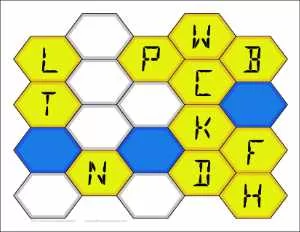It’s almost the end of another semester, and that means it’s time to review what we’ve been teaching over the past few months. I’ve chosen my 5 favourite review activities for adult ESL classes. But before we get into it, what are my criteria for the list? Firstly, they are all team activities because it’s a great opportunity for peer learning. Secondly, they are fun and engaging. Third, and perhaps most importantly, they will review the language from previous classes. Ok, now we’ve established the criteria, let’s get going!
Blockbusters
Brits of a certain age will fondly remember this quiz show from the early nineties, and it’s first on our list of review activities for adult ESL classes. Why? Because a variation on this quiz show is a great way to review vocabulary.
In the TV quiz show, there is a board of 20 hexagons that contestants take turns to try and make a path across; either from one side to the other or from top to bottom. Each hexagon has a letter of the alphabet, and the answer to the question begins with that letter. Contestants take turns in choosing a letter. If they get the question right the hexagon changes to the colour of their team.

You can watch a classic episode of Blockbusters here:
In class you can play this either by printing a hexagonal grid (enlarging to a larger size if possible) and writing the letters on, then taping it to your board. Alternatively, you could put the grid in powerpoint, add the letters, then project it onto the whiteboard rather than the screen. Assign each team a colour – you should have matching marker pens for the team colours. Then, when a team gets a question right, colour in the hexagon.
Need a hexagonal grid to print, or for a ppt? Click here.
Jeopardy
Across the pond is another great quiz show which works well as a review activity. In Jeopardy, there are 5 categories and 5 questions in each topic – each question with a different number of points for the right answer. The point system is quite popular and there are lots of powerpoint templates on the internet. However, most people might miss the best thing about Jeopardy – that the question is the answer; contestants are given the answer, and they must come up with the correct question. This makes it a great activity for the ESL classroom to practice forming questions. I always use Jeopardy to review superative adjectives. So if, for example, the answer is the (river) Nile. What’s the question? Students must answer ‘What is the longest river (in the world)?’ to get the points.
There are lots of templates for Jeopardy on the internet. If you are paralized by choice, I have been using the first one on the list from template.net (we have no affiliation with template.net)

Sentence Auction
Time to pick up your gavel and ham it up as an auctioneer! A sentence auction is a great way to review language in the ESL classroom. It’s also a great activity to do at the beginning of semester to find out what students don’t know and which errors they tend to make.
You need a list of about 15 sentences relating to the language you have studies in class. 8 sentences should have errors. Each team will need some money to spend at the auction, so ‘give’ them one thousand bucks, pounds, euros or whatever, by writing that amount under their team name on the board.
One by one, write the sentences on the board, and let the teams bid for them. One great thing about a sentence auction is when an otherwise disinterested student suddenly gets bit by the auction bug and gets involved in a big way. When auction fever takes hold, and teams are bidding aggressively for a bad sentence, it can be quite hard to keep a straight face.
After all the excitement of the bidding, it’s time to go through the sentences and check the mistakes. The team that gets the most correct sentences, are the winners.
You can review a wide variety of language with sentence auctions; grammar, vocabulary, collocations, phrasal verbs, prepositions, fixed phrases, or idioms. For more detail on how to successfully run a Sentence Auction, check out this blog ‘Sentence Auction- A Versatile Tool’.
Bomb Games
Bomb games are a popular with kids classes, but that doesn’t mean they aren’t great for big kids too and perfect for a light-hearted review lesson. A good bomb game, adds an element of randomness to the point scoring. The strongest team might lose to a weaker team because points are awarded randomly, or there are chances for points to be lost or stolen. Therefore, they can help avoid demotivation that might come from continually losing class activities. For weaker students, or busy students who haven’t been able to find time to review, this can be a great way to show them their weaknesses and what they need to study.
Fun and chaotic, bomb games are a great way to end the semester or review before an exam. Most bomb games have one question for each letter of the alphabet, so you’ll need 26 questions in total. There are lots of bomb games available on the internet for free. We also have a variety of bomb games on out TpT store, including a magical themed bomb game called ‘I Put a Spell on You‘.
Hotseat
Hotseat is a vocabulary review activity, with a focus on speaking – and our final choice for our Top 5 review activities for adult ESL classes. One member of each team sits with their back to the board, and is prohibited from turning around to see the board. This is the Hotseat. The teacher writes a word on the board, and the rest of the team must try and explain the word without actually saying it. The first student in the Hotseat to guess the word – by standing up and say it out loud (or shouting it) – gets the point for their team.
There are a few rules; only English is allowed, there’s no miming, and you can’t say the word on the board. You may need to add more rules depending on your students. I usually subtract one point for infringing the rules.
This is a fun way to review vocabulary, and can get quite hectic. It works best with mixed nationality groups. Want a step-by-step guide to running this activity, including tips and variations? Check out our full blog post on how to use the Hotseat ESL game.
Top 5 Review Activities
Well, those were my Top 5 review activities for adult ESL classes. It was quite difficult narrowing it down to just five. Do you disagree with any? Did I miss one one of your favourites? Let me know down in the comments below.
What’s Next?
Are you looking for more activities to do at the end of semester? You may also be interested in our blog on Final Day Activities for ESL Classes.

